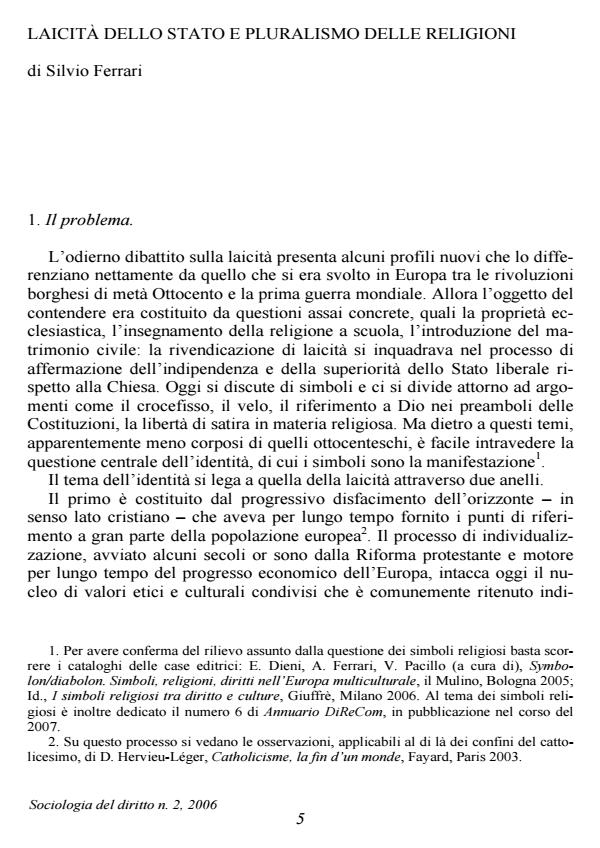Laicità dello stato e pluralismo delle religioni
Titolo Rivista SOCIOLOGIA DEL DIRITTO
Autori/Curatori Silvio Ferrari
Anno di pubblicazione 2006 Fascicolo 2006/2
Lingua Italiano Numero pagine 27 P. Dimensione file 108 KB
DOI
Il DOI è il codice a barre della proprietà intellettuale: per saperne di più
clicca qui
Qui sotto puoi vedere in anteprima la prima pagina di questo articolo.
Se questo articolo ti interessa, lo puoi acquistare (e scaricare in formato pdf) seguendo le facili indicazioni per acquistare il download credit. Acquista Download Credits per scaricare questo Articolo in formato PDF

FrancoAngeli è membro della Publishers International Linking Association, Inc (PILA), associazione indipendente e non profit per facilitare (attraverso i servizi tecnologici implementati da CrossRef.org) l’accesso degli studiosi ai contenuti digitali nelle pubblicazioni professionali e scientifiche.
The fact that the state is secular no longer has the priority of indicating an attitude towards religion on the part of the state, but the ways and means with which the state tackles the problem of the cultural, ethnic and linguistic diversities that cut through its own population. These days, the debate about secularism cannot be limited any more to a question that turns exclusively on the dialectic between State and Church, without considering the ethical and cultural fragmentation nourished on the one hand by atomising individualism and on the other by society’s division into partial communities. Two notions of secularism emerge in this new context. The first refers to a set of principles and values (tolerance, democracy, freedom, equality etc.) around which citizenship should be constructed: in this sense, secularism sets itself up as the civil religion of the Europeans (as opposed to Christianity, which others believe should be fulfilling the same function). The second sets itself up as a rule of social and religious pluralism. This second notion of secularism is partially asymmetric to the first: the terrain it occupies is not primarily that of contents, but that of means; it does not take the form of secularism as a programme, but of secularism as a method. These two notions of secularism deserve to be kept clearly distinct, as the one is substantial in nature, while the other is methodological. While Europe may tend more towards secularism or towards Christianity as its civil religion, European society cannot afford to do without this second dimension of secularism if it is to avoid betraying its identity. Such a step would in fact imply giving up the mediation of law, which is what stops any one system of values (even the one espoused by the majority) from taking over the institutions of the state and transforming them into a great sounding board, so as to homogenise the ultimate sense of belonging, the beliefs and preferences of its citizens.
Silvio Ferrari, Laicità dello stato e pluralismo delle religioni in "SOCIOLOGIA DEL DIRITTO " 2/2006, pp , DOI: